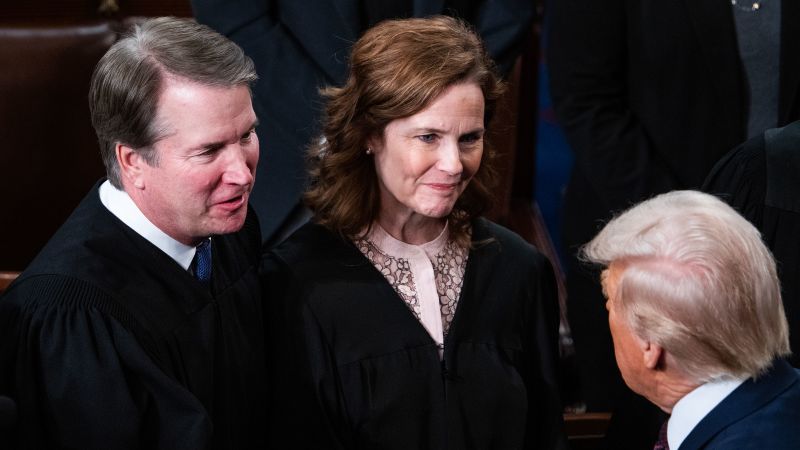President Donald Trump has reportedly expressed dissatisfaction with several Supreme Court justices he appointed, notably targeting Justice Amy Coney Barrett with particular frustration. Sources familiar with his complaints indicated that Trump’s grievances have been ongoing for over a year and encompass not only Barrett but also Justices Neil Gorsuch and Brett Kavanaugh. His conversations, largely held in private, suggest that he feels these justices have not consistently supported his political agenda.
Trump’s anger seems to be influenced by his allies on the right, who have been vocal in criticizing Barrett. They have labeled her as “weak” and suggested that her rulings do not align with the conservative principles she espoused at the time of her nomination in 2020. A senior administration official shared that Trump has complained about several instances of Barrett’s judicial decisions, indicating a pattern of frustration rather than isolated incidents.
In an official statement, principal deputy press secretary Harrison Fields affirmed Trump’s ongoing respect for the Supreme Court, asserting that he stands with the institution even when he disagrees with its rulings. Fields contrasted Trump’s stance with what he described as the Democrats’ intentions to potentially “pack the court,” stressing Trump’s appreciation for the court’s foundational role in American democracy.
While the administration offered a supportive narrative regarding Trump’s relationship with the judiciary, the Supreme Court itself did not provide comments on Trump’s remarks. The tension between Trump and the judiciary has escalated, particularly as he has publicly criticized various court decisions without holding back, exemplified by his ire directed toward prominent legal figures like Federalist Society leader Leonard Leo, who assisted in identifying many of his judicial appointees.
In a scathing post on social media, Trump called Leo a “real ‘sleazebag’,” suggesting a profound disappointment in the individuals he once trusted to uphold his policy preferences. Moreover, Trump’s frustration with Barrett isn’t a new development; it intensified earlier this year when she voted against his initiative to cutoff nearly $2 billion in foreign aid. Trump’s supporters voiced swift reactions, with some derogatorily remarking on her capabilities as a justice, invoking a discourse that perceived her as lacking competence.
Following Barrett’s decisions, including one involving a New York legal matter that saw Trump’s sentencing proceed, Trump’s circle has reported rising discontent with her performance. Specifically, Barrett’s recent recusal from a significant case concerning taxpayer funding for a Catholic charter school in Oklahoma also stirred disapproval among conservatives. Her recusal left the court in a 4-4 deadlock, allowing an existing state ruling condemning the school to remain in effect, which further spurred criticism from Trump’s allies.
Some members of Trump’s network speculated that Barrett’s legal judgments may have been influenced by external pressures, including threats posed against her and her family. In one particularly alarming incident, her sister faced a bomb threat, prompting Trump to inquire whether enhanced security measures could ease Barrett’s concerns and ensure her welfare.
Despite his private frustrations with her decisions, Trump has opted against public condemnation of Barrett. In earlier instances, he characterized her as “a very good woman” following her dissenting vote on foreign aid. Insiders suggest that Trump’s respect for the Supreme Court plays a role in his decision to refrain from direct personal attacks on his appointees.
Evaluating Barrett’s performance, critics have observed that, despite intense scrutiny, she has often voted in line with conservative outcomes on several significant rulings. Data has shown her alignment with the court’s conservative faction, consistently backing decisions that align with Trump’s legislative priorities, although her recent actions have led to divisions within the conservative realm.
Barrett’s role remains pivotal in the Supreme Court, and while some may argue that she diverges from the hardline conservatism of justices like Clarence Thomas and Samuel Alito, her overall judicial behavior aligns with the traditions of her appointment. Observers of the court often highlight her ability to engage critically with legal arguments, as seen in her questions during pivotal cases concerning presidential immunity.
As the discourse surrounding Trump and his appointed justices evolves, Barrett stands out as an influential figure on the court whose decisions may shape the judicial landscape for years to come. Balancing personal convictions with the inherent pressures of political expectations, Barrett’s judicial approach will continue to attract attention and speculation in the ever-evolving dynamics of American politics and law.



